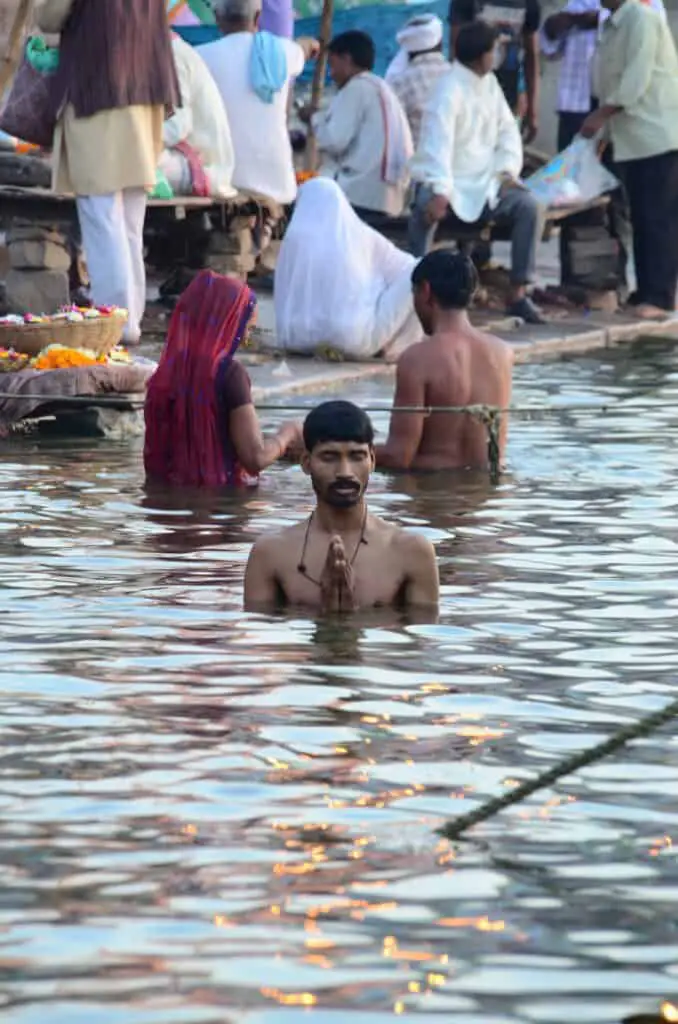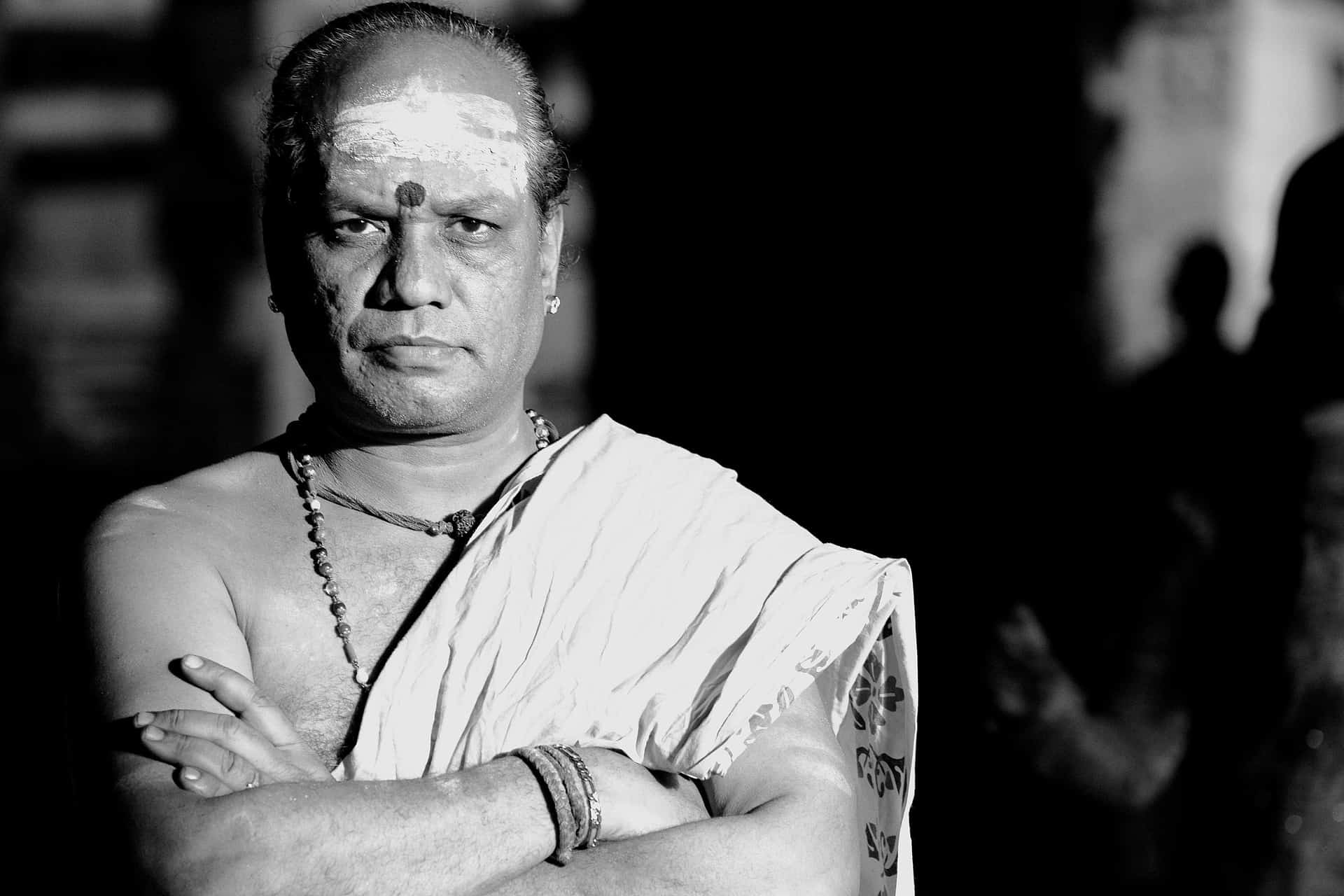A pujari/priest/Pandit is a Hindu sanctuary cleric. The word originates from the Sanskrit word Puja which means love. They are answerable for performing sanctuary ceremonies, including puja and aarti. Pujari is for the most part drawn from the Hindu Brahmin.

Types of priests
Extensively, in Hinduism, the priests who perform temple ceremonies fall into at least one of the accompanying four principle customs because of their station, family, and partisan affiliations.
- Shaivism
- Vaishnavism
- Shaktism
- Folk traditions
In Vaishnava temples, priests follow either Vaikhasana or Pancaratra practices to lead love. Of the two, the Vaikhasana is viewed as the eldest and a group in itself. In most Vaishnava temples of southern India, including the Tirumala, Tirupati, and Madurai temples, the temple ceremonies are performed by Vaikhanasa priests. Numerous Brahmin families who live in seaside Andhra, Karnataka, Tamil Nadu, and Kerala have a place with this group. It is said that they relocated from northern India during bygone eras and got comfortable with these parts from that point forward. Some of them additionally have practical experience in Ayurveda.
In Shaivism and Shaktism likewise, we go over a few varieties in customs and practices, as they are additionally separated into a few sub-organizations, each having its own conventions, theory, and conviction framework. For instance, supporters of Kashmir Shaivism, ViraSaivism, and Pashupata Shaivism follow various techniques for love and elusive customs. In the current day world, with the ascent of mainstream Hinduism and the development of present-day temples which house a few divinities having a place with various orders, you may not see a lot of specialization among the priests who work there. You may see a similar minister revering various gods or a similar arrangement of priests sharing their obligations and duties as indicated by the timetable fixed by the temple organization. With the development of temples for lawmakers, film stars, and masters of present-day times, the custom is getting additionally weakened.
The Temple priests
Every temple will have its minister or even an entire group. They frequently originate from the brahmana network. Just as playing out the normal love, (puja, the arti function, and so on.) they may direct uncommon services, for example, different transitional experiences, both in the temple and at individuals’ homes. Customarily just men are permitted into the ministry, however certain developments, for example, ISKCON likewise welcome ladies.
In the UK the priests are relied upon to adhere to specific principles and guidelines, for example, following a vegan diet, and going without inebriation and betting. Customarily numerous priests were found out and thus called “pandit.” They were required to be learned in sacred writing and Sanskrit.
Key points
- The temple cleric is known as the pujari (one who performs puja)
- They are frequently called or named purohit
- They are frequently tended to as pandit (or pandit-Ji), keeping in mind their learning
- They are typically Brahmanas (by birth or potentially characteristics)
- Priests are relied upon to observe severe guidelines with respect to internal and external virtue to hold the holiness of the temple
- Most are men yet a few gatherings acknowledge ladies as priests
Roles and Responsibilities of a Hindu Priest
A Hindu cleric is otherwise called ‘Purohit’ or ‘Pandit’ has numerous duties at whatever point they are answerable for performing customs, services and consistently adheres to the guidelines of temple ceremonies. Subsequently, it has become extremely normal that during each puja a Pandit is called to play out all the ceremonies. However, in some cases, it happens that for puja we probably won’t discover Pandit on schedule. In such a case, one great choice to decide is to book a Pandit on the web.
There are numerous online puja locales from where one can without much of a stretch fix a minister for the puja on the ideal date. Not just that, they likewise manage you with a lot of other data that can truly support you. Now and then it additionally happens that alongside a Pandit you can likewise book puja online which implies that you get all the puja samagri from that store. Additionally now and again on an uncommon event or during celebrations, these online puja shopping locales offer limits that are commendable for individuals to snatch it.
Here are a few jobs and obligations of Pandits which one must know
Confidence
Pandits are the most creative individuals when it comes to profound information. It is significant that all the Pandits must be knowledgeable with Sanskrit language and furthermore read the Vedas well. He ought to likewise have the option to present the mantras which are in the Sanskrit language. The favors from the cleric are likewise viewed as hallowed in numerous Hindu people groups. The priests additionally spread the confidence of Hinduism among numerous networks.
Customs
Most of the Pandits perform puja consistently or a few times on one specific day. There are numerous ceremonies which get remembered for puja however all the pujas don’t have the same customs. The priests know very well that in what puja what customs are performed. The priests when doing pujas in the temples ring the temple chimes and serenade mantras to revere Gods.
Functions that priests perform
It is said that all the propitious service customs are performed by the priests, for example, weddings or string functions. This service connotes the happening to a youthful Hindu man in the family. Aside from these predetermined functions, there are different ceremonies that the priests play out all year.
Obligations in Temples
In temples you find numerous priests who consistently offer love to Gods and furthermore it is the duty of the Pandits that they take care of the temples and keep them up efficiently. They take care of the temple special raised area and furthermore as they are very knowledgeable so they likewise gave the obligation to compose the bulletins for the temple. Not just this, numerous priests additionally offer strict classes to the adherents of Gods.
What are the necessities to turn into a Hindu priest?
Hindu priesthood is normally gone on through a family genealogy. Notwithstanding, in current days there are schools where individuals can figure out how to be a cleric. Like any calling, it very well may be taken up with the correct preparation.
Contingent upon the god, there might be explicit ceremonies, mantras, and practices that a cleric should ace. Somewhat like learning fundamental language and afterward acting on explicit writings in science or writing required for explicit callings.

A Hindu minister doesn’t rake in tons of cash or control a lot of intensity. Regular priests play out the job on the grounds that – possibly they know nothing else to do or they have the most extreme dedication to the divinity they are liable for.
Not being a composed religion, there is no ‘pecking order’ for Hindu priests to climb. Priests are not equivalent to our ‘sages’ and ‘masters’. Subsequently, from a profound point of view, there is no assurance that a minister could get to those respectful levels in Hindu society.
Thus, it’s anything but pined for work nowadays. You will bring in much better cash working in a called community or takeaway eatery. Social reformers in the past thought especially about the rankism that had flourished around there. Notwithstanding, it is a very remarkable non-issue these days as temples will be fortunate to locate a devoted, learned, and all around prepared minister.
Hindu Priests And Brahmins

Individuals who go about as authorities at temples, leading or helping in love, are known as pujari or priests. Their primary obligation is to go about as mediators between the admirers and god. These priests should be Brahmins – individuals from the most elevated positioning standing gathering that have customarily been priests. Brahmin wears the hallowed string. They have generally been the last adjudicator of virtue and overseers of temples. No one, but they could enter the inward safe-havens of temples and conjure the gods there for puja.
Actually, Hindus should be helped by Brahmin priests when performing customs or functions, yet most basic services, for example, making contributions, are managed without one. An assortment of go-between priests, blessed men, and educators perform and help with customs. Brahmin has generally not performed ceremonies for lower stations in any case. In provincial regions nearby headmen regularly manage customs.
Nowadays Brahmins frequently fill in as priests in temples for higher gods while priests from lower standings serve at temples for lower positioned divine beings. Numerous Brahmin either play out their temple obligations as a sort of low maintenance work or interest. Many play out no religious obligations at all. One Brahmin cleric at a south Indian temple told the New York Times, “There’s no cash in it anymore. I trust my children accomplish something different. The salary isn’t sufficient to live anymore.”
A look into the the day of a Priests life
The individuals who work in the temples as priests need to lead a stark and trained life. They must be knowledgeable in the sacred writings and custom information. They can’t capitulate to any bad habit or fiendishness. They must be liberated from avarice, outrage, desire, envy, and different wrongs. A cleric is a worker of God, who has just a single mission throughout everyday life, to deal with the day by day needs of the divinity he venerates. He has no other obligation, on the grounds that the divinity will be answerable for his own life. Hypothetically, for him, the requirements of God are a higher priority than his own needs. Having a decent minister in your nearby temple is a gift, in light of the fact that through his activities he can have any kind of effect on various individuals who visit the temple and offer their appreciation.
The connection between the god and his minister is extremely close to home, profound, and personal. Each cleric must be a Bhagavata, a worker cum-aficionado of the divinities he reveres. He needs to place his essence into his administration and love God with most extreme dedication, however with no longing or desires for himself. Consistently, he is required to get up promptly toward the beginning of the day, scrub down, wear clean garments, play out his morning oblations, wear fundamental imprints upon his body as per the faction to which he has a place, and start the day with a steady psyche. At that point he ought to go to the temple, to start his everyday administration. At the temple, he should eliminate the previous contributions, (blossoms, and so forth.,) from the spot of love, clear the floor in the sanctum or the room where the god is introduced, and clean the instruments and utensils utilized in the love.
Pachakam (assistant of priests)
While the archakas are answerable for the love of the god, they are aided their obligations by a few others. Conspicuous among them are the pancakes, who are predominantly liable for planning conventional food things (naivedyam) that are utilized in the contributions made to the god. In the wake of offering to the god, the remaining parts are appropriated among the fans. The individuals who are answerable for planning and preparing the food things additionally hail from the Brahmin families. In a few antiquated temples, the option to prepare nourishment for God is genetic and rests with a couple of families. Food might be arranged either in the temple premises or outside. The pachakam needs to set up the food in a sattvic way, utilizing the most perfect of the fixings that are worthy to the divinity and keep up exacting individual control as set down in the sacred writings to abstain from bringing about his dismay. In setting up the contributions, they need to remember that they can’t settle on the quality of immaculateness. A portion of the arrangements is generally notable. For instance, the sweet balls (laddus) and other food things arranged by the Tirumala temple for Lord Venkateswara are worlds celebrated.
Brahmin Priests and Women
Among Brahmins just men are permitted to fill in as ministers; ladies are frequently answerable for the day by day pujas. Brahmin ladies are relied upon to wash their better half’s feet every morning as an indication of regard.
Brahmins may go about as family priests for upper positions yet not lower ones. They can direct at sanctuaries and temples and at customs related to significant celebrations. They direct all the customs performed at marriage, are available at significant strict events, and perused selections from the Vedas and other consecrated Sanskrit messages and recount from the Puranas and the Ramayana and Mahabharata. Brahmins are in some cases paid for their administrations with dairy animals instead of cash.
Conclusion
In Hinduism, admirers can love their own gods remotely (bahya) with explicit petitions and contributions or inside (month) with perception. Most priests are Brahmanas, whose other primary capacity is instruction. Brahmanas are regularly called pandit, signifying “learned researcher.” Here a western-conceived brahmana recounts the account of Rama and Sita to schoolchildren.
People also ask
What is a Brahmin priest?
Brahmin People who go about as authorities at sanctuaries, leading or helping in love, are known as pujari or priests. Their fundamental obligation is to go about as go-betweens between the admirers and god. These priests should be Brahmins – individuals from the most elevated positioning standing gathering that have generally been priests.
Can a woman be a Hindu priest?
Female priests are a generally new marvel in India, they’re still incomprehensibly dwarfed by men. Researchers state that dissimilar to in the Catholic church or Islamic custom, there’s nothing in Hindu sacred books that prohibits ladies from turning out to be strict pioneers.
What is the role of a Hindu priest?
Their essential obligation is to direct day by day supplications (puja) at the sanctuary. During Hindu celebrations, customary occasions, for example, weddings, the hallowed string service, execution of last rituals, and unique god functions, priests are called upon to lead pujas.
Who do Brahmins worship?
Brahma, who is a Brahmin god, is likewise the prime originator of the ‘varna’ framework which later hardened as the rank framework. Brahmins utilized Brahma’s name as a pen name, and they composed the ‘Vedas’. As indicated by Ilaiah, “the Vedas are hostile to Dalitbahujan messages. Brahma is an image, a feeling, not something that can be bound inside the four dividers planned by brahmins, so they can rule over the first occupants of the land.

